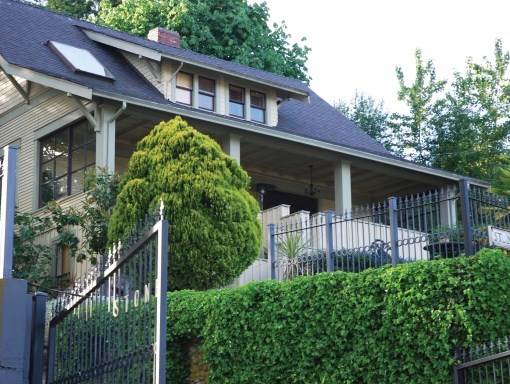Gibsons council has voted to negotiate the possible sale of part of the Town-owned land beside Stonehurst, a heritage property at 529 Gibsons Way.
The Town announced in early August that it had been approached by Stonehurst’s owners about purchasing part of the property known as Lot 23, and launched an online survey to get feedback.
Lot 23 was first purchased by the Town in 1980 for $50,000 and is mainly used as public parking, although the front edge has been preserved as green space.
The offer from the Stonehurst owners was $725,000 for 57 per cent of the lot, which the Town said is assessed at $746,000.
The results of the online survey were presented to council at its Oct. 6 meeting.
Of the 196 people who responded, 93 per cent were from Gibsons and the responses were largely in favour, with 66 per cent saying they agreed “council should consider the request.”
Elizabeth Quayle, the Town’s communications coordinator, said the people who responded in favour gave reasons that included wanting to see Stonehurst preserved as well as improvements to the park space in front of Stonehurst. They also liked the idea of more housing in Lower Gibsons.
Quayle also said that several of the people who said they supported council continuing to consider selling part of Lot 23 qualified that support by saying they still wanted to see the developer’s full plan.
The development application has not yet come before council or committee, and all the Town has said so far is that it would involve preserving and upgrading Stonehurst as a small boutique inn with a main-floor coffee shop or bistro and 21 new residential units elsewhere on the property as a cluster of three- to four-storey buildings.
Quayle told council that those opposed cited reasons like the potential for increased traffic, too much density and a concern that the deal would benefit the developer more than the Town.
Council voted unanimously to accept a development application, including zoning and official community plan amendments, and “support in principle” selling a portion of Lot 23 to the developer “to facilitate the development proposal subject to zoning approvals.”
Coun. Annemarie De Andrade said based on the input from the community she also wants the public to be able to see the full development proposal as soon as possible.
“The public has not seen any design at this point, and even council saw [only] a very rough sketch,” she said.
De Andrade also said the Town should look into a formal heritage designation for Stonehurst or some other mechanism to guarantee its preservation, but other councillors said that idea should be approached very cautiously.
“If we had it in our power to protect Stonehurst independently of all this it would have been done a long time ago,” said Mayor Bill Beamish. “The challenge with any heritage protection is that it has to be agreed with by the owner. It’s not something you can impose and there’s not a lot of incentive for an owner to enter into heritage protection because there’s a lot of cost associated [with it].”
Coun. Stafford Lumley said he thinks the public will support the developer’s plan for the preservation of Stonehurst and that the Town will be able to ensure the building’s preservation through the development approval process.
Coun. David Croal called heritage designations a “double-edged sword.”
“I think we have to be very careful what we thrust upon a property owner,” he said.
When the Stonehurst property was last on the market in 2017, the council of the day rejected the idea of a formal heritage designation as too restrictive and looked instead at special zoning and a covenant to protect the exterior character of the building but allow interior renovations.
Only two buildings in Gibsons have a formal heritage designation, and both are publicly owned – the school building at School Road and Gibsons Way and the Heritage Playhouse.



